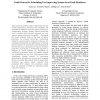Free Online Productivity Tools
i2Speak
i2Symbol
i2OCR
iTex2Img
iWeb2Print
iWeb2Shot
i2Type
iPdf2Split
iPdf2Merge
i2Bopomofo
i2Arabic
i2Style
i2Image
i2PDF
iLatex2Rtf
Sci2ools
ICPP
2007
IEEE
2007
IEEE
Fault-Driven Re-Scheduling For Improving System-level Fault Resilience
The productivity of HPC system is determined not only by their performance, but also by their reliability. The conventional method to limit the impact of failures is checkpointing. However, existing research shows that such a reactive fault tolerance approach can only improve system productivity marginally. Leveraging the recent progress made in the field of failure prediction, we propose fault-driven rescheduling (FARS) to improve system resilience to failures, and investigate the feasibility and effectiveness of utilizing failure prediction to dynamically adjust the placement of active jobs (e.g. running jobs) in response to failure prediction. In particular, a rescheduling algorithm is designed to enable effective job adjustment by evaluating performance impact of potential failures and rescheduling on user jobs. The proposed FARS complements existing research on fault-aware scheduling by allowing user jobs to avoid imminent failures at runtime. We evaluate FARS by using actual wor...
Distributed And Parallel Computing | Failure Prediction | Fault-driven Rescheduling | ICPP 2007 | User Jobs |
| Added | 03 Jun 2010 |
| Updated | 03 Jun 2010 |
| Type | Conference |
| Year | 2007 |
| Where | ICPP |
| Authors | Yawei Li, Prashasta Gujrati, Zhiling Lan, Xian-He Sun |
Comments (0)

